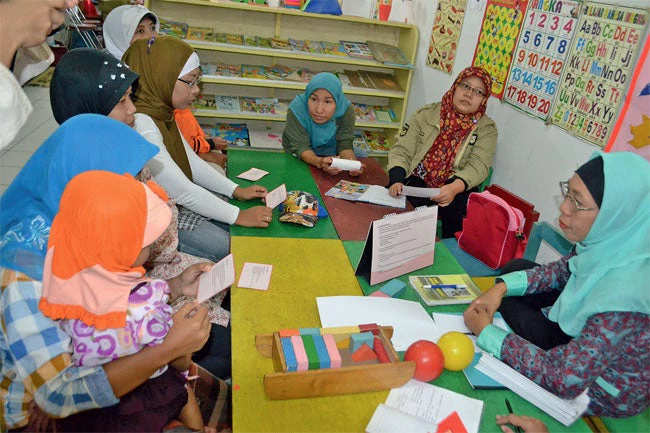
Ed's note: This guest blog is by Heather Biggar Tomlinson (Executive Director, Roshan Learning Center) and Syifa Andina (Chairperson, Foundation for Mother and Child Health)
There is a dynamic and growing energy in Indonesia focusing on parenting education, particularly for low-income families. However, little is known about parenting styles and related outcomes, much less the coverage and effectiveness of various parenting education approaches.
Parenting education programs aim to improve the well-being of both parents and children by creating awareness of the importance of parents in supporting children’s development and success.
Through decades of studies across countries, we know that effective parenting education programs can improve child nutritional levels, strengthen children’s cognitive and literacy skills, reduce problem behaviors, and reduce parents’ depressive symptoms and substance rates.
In a recent show of commitment, Indonesia’s Finance Minister, Sri Mulyani Indrawati, pledged to unlock the potential of her country’s young children as a way to help create future economic growth. Minister Indrawati mentioned that despite a 20 percent spending in education, almost 37 percent of three to six year olds do not attend early childhood education programs. This underscores the role of parents and how they can support children’s development and success.
To this end, Indonesia just created a new position within the Ministry of Education and Culture - a Director for Family Education Development, which represents the country’s growing attention to the issue of parenting education.
Our report, Parenting Education in Indonesia: Review and Recommendations to Strengthen Programs and Systems, seeks to complement these efforts by providing a snapshot of parenting education programs in the country through evidence collected via interviews and field visits.
We found that many of Indonesia’s parenting education programs focus on the poor or operate in poor districts. Programs take place once a month for one to two hours and serve one or two dozen parents, usually mothers. Facilitators are often untrained and underpaid (or unpaid) health care workers, teachers, or parent volunteers who are given a loose set of messages to discuss according to their own or the participants’ interests.
How can parenting education materials be improved in Indonesia and in other countries facing similar challenges? Here are five ways:
#1 Invest in trainers and facilitators. Improve the selection of trainers and facilitators to ensure that their background and skills match the parenting sessions assigned to them. They should be given adequate pre-service training and in-service professional development support so they can become knowledgeable and confident leaders. It helps to compensate them (beyond transportation reimbursement fees) to reduce turnover and build a corps of competent, effective facilitators.
#2 Give parents opportunities to practice. Provide time during sessions for parents to practice what they learn. Parents may learn about good communication skills, how to play games with their children, or the importance of vocal tone and body language, all of which can be practiced in session with children. Facilitators can model, observe participants practicing with their children, and provide feedback and encouragement. (We do not recommend that children participate in the entirety of every session; keep some space open for in-session practice.)
#3 Use technology. Indonesia is the fourth-largest Facebook market in the world and sends out 15 tweets a second, 87% of which are sent by mobile phones. Even many low-income parents have mobile phones, which can be used to stay connected, send reminders and encouraging messages about session materials, and share photos. In one program serving low-income parents, the community uses WhatsApp groups to allow teachers to send homework reminders to parents, send holiday wishes, invite teachers to karaoke outings, keep track of children’s bus numbers on field trips, and share photos and videos. It is a highly interactive platform that enhances the sense of social cohesion within the group.
#4 Encourage learning through acting, not just listening. Develop activity guidelines that will give facilitators step-by-step session implementation support for how to teach parents. The least experienced facilitators will benefit the most from practical implementation ideas. Facilitators should incorporate active learning methods such as participatory games, discussion and reflection, role playing, and paired or small-group activities to keep participants interested and engaged.
#5 Ensure adequate dosage. Increase the number of sessions offered and the meeting duration time, particularly for those with lower education levels or especially vulnerable groups. Instead of holding 12 sessions over the course of a year, groups will be more effective if they hold 12 sessions over 3 months--or better yet, weekly sessions over the course of a year.
Results
It is promising to see that the National Population and Family Planning Board (BKKBN), a leading non-departmental body responsible for parenting education in Indonesia, took into account some of these recommendations. BKKBN recently updated its training modules for parenting classes, called Bina Keluarga Balita (BKB – Building Families of Young Children), by articulating goals and identifying indicators such as parents’ behaviors and practices that support child development, learning, health and protection.
The process resulted in step-by-step activity guidelines commenting not just on what messages to convey, but on how to convey messages to parents. Modules now incorporate more engaging, active and participative approaches to learning – including an animated video. Parents are given homework after each session to help them remember and reinforce new parenting practices.
Next steps
One key to designing well-implemented programs is to be specific in their goals and targeted in their outreach, rather than try to be all things for all people.
As we mentioned earlier, Indonesia is making strides for early childhood development. The next critical step for Indonesia is to decide on its national goals for parenting education. National leaders should debate the county’s priority areas and reach consensus on which areas of parenting deserve Indonesia’s attention and resources.
This conversation should lead to a national-level road map, along with a set of program standards for parenting education, which would elevate the quality of programs while allowing for local ownership and flexibility. Subsequent steps will fall into place: leveraging the best existing platforms for delivery, refining content and pedagogy materials to build up facilitator capacity, engaging monitoring and evaluation experts so that Indonesia will have national-level data, and creating demand among parents.
Get updates on the World Bank Group’s work on education on Twitter and Flipboard.
See resources on early childhood development here



Join the Conversation